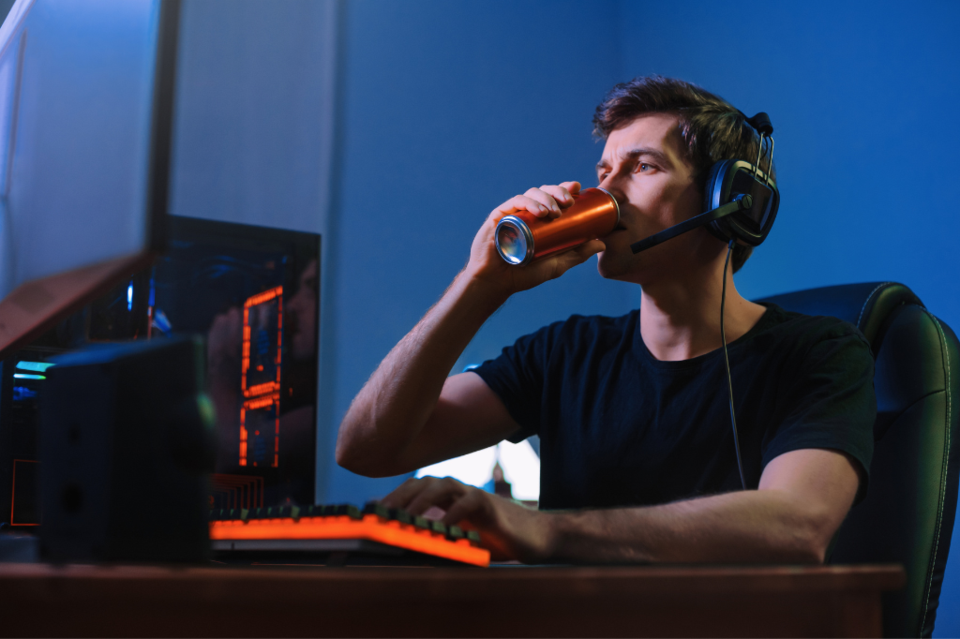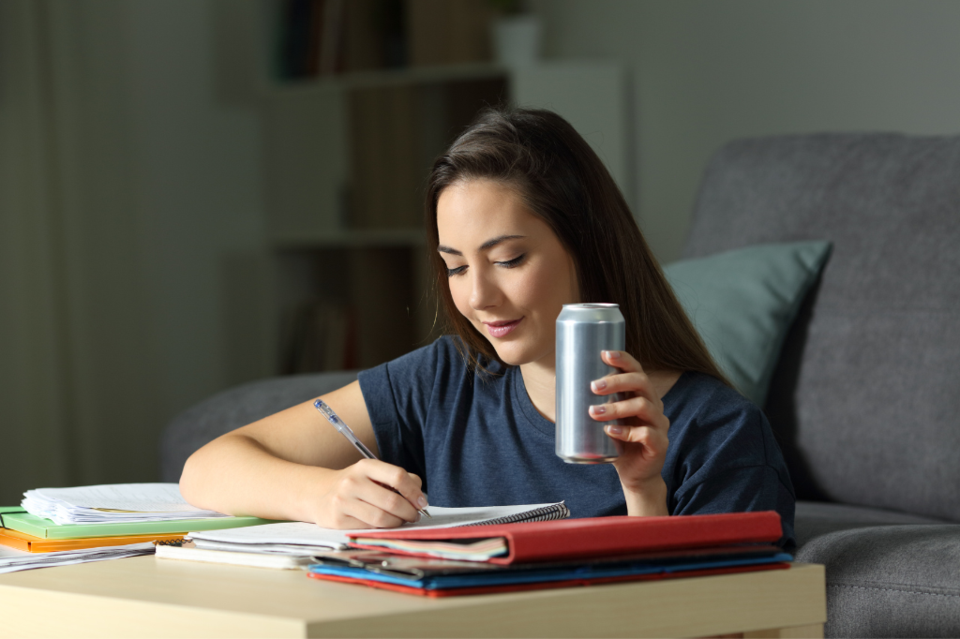We’ve all had one—that mid-afternoon slump where your focus fizzles, your to-do list glares, and you reach for something cold and caffeinated in a flashy, overstimulating can (Raspberry Riptide Adrenaline Slam, anyone?).
Energy drinks promise to power you through fatigue and mental fog—but at what cost?
While they may deliver a quick jolt, the ingredients in many energy drinks can have serious effects on the brain and body—especially if they’re consumed regularly. If you’ve been relying on them to get through your workdays or workouts, it might be time to rethink what’s in your cup.
Let’s take a closer look at what energy drinks do to your brain, what the research says, and what to sip instead for smarter, longer-lasting energy.
What’s actually in an energy drink?
Most energy drinks contain a combination of caffeine, sugar or artificial sweeteners, B vitamins, amino acids (like taurine), herbal extracts (such as guarana or ginseng), and sometimes other stimulants like yerba mate or yohimbine. The exact formulas vary, but many are built around one central ingredient: caffeine—and lots of it.
The average energy drink contains between 80 to 300 mg of caffeine per serving. That’s roughly the equivalent of one to three cups of coffee—but consumed quickly and often alongside other stimulants, which can intensify the effects.
Health Canada recommends that adults limit their caffeine intake to no more than 400 mg per day. That includes coffee, tea, soda, chocolate, and energy drinks combined. Teens should consume even less—no more than 2.5 mg of caffeine per kilogram of body weight.
What these ingredients do to your brain
Caffeine is a central nervous system stimulant. It blocks adenosine receptors in the brain—those are the signals that make you feel tired. This makes you feel temporarily more alert, but it also triggers a release of adrenaline, raising your heart rate and blood pressure.
Taurine, another common ingredient, is an amino acid that may help regulate water and mineral balance in the brain, but its effect when combined with caffeine is still not well understood.
Guarana is a natural source of caffeine, often added on top of synthetic caffeine—meaning you're often getting more than you think. High doses of caffeine, especially when consumed quickly, can lead to anxiety, restlessness, irritability, and sleep problems. Some studies even link frequent use to increased risk of dependence and poor mental health outcomes, particularly in teens and young adults.

The long-term impact of energy drinks
Over time, chronic consumption of high-caffeine energy drinks may negatively affect your sleep quality, which in turn impairs memory, concentration, and emotional regulation. And because they often contain large amounts of added sugar or chemicals that mimic sugar—sometimes more than a can of pop—they can also spike and crash your blood sugar, leaving you more drained than before.
In extreme cases, overuse has been linked to heart arrhythmias, seizures, and even hospitalizations. One Canadian study found that over 55% of teens who consumed energy drinks reported experiencing at least one adverse health effect, including headaches, nausea, and chest pain.
Healthier alternatives for sustained energy
You don’t need a flashy can of Tiger Venom Punch to feel focused. These natural alternatives offer energy without the crash, plus some additional health benefits, to boot:
- Matcha: Unlike coffee, matcha contains L-theanine, an amino acid that tempers caffeine’s effects, offering a calmer, longer-lasting boost.
- B vitamins: These help convert food into energy and support brain function. Try a smoothie with leafy greens, banana, and nut butter for a whole-food boost.
- Adaptogenic herbs: Rhodiola rosea and ashwagandha are both known to support the body’s stress response and improve mental stamina over time.
- Hydration with electrolytes: Fatigue is often a sign of dehydration. Add a pinch of sea salt and lemon to your water or opt for a sugar-free electrolyte powder.
- Movement and light: A brisk walk outdoors or 10 minutes of stretching can re-energize you more effectively than a can of caffeine ever will.
Bottom line
Energy drinks might offer a quick fix, but your brain (and body) deserve better. Opt for natural solutions that support your mental and physical energy in the long run. After all, there’s no magic bullet for energy—just smart habits, real nourishment, and a little less reliance on a quick fix in a can.
About the Author

Alicia is a journalist and editor in digital and print media specializing in health, nutrition, fitness, and wellness. She was previously the Editorial Director of Clean Eating and Vegetarian Times. Her work has also appeared in Hone Health The Edge, Yoga Journal, Women’s Running, and Oxygen, among others. In addition to being a content creator, she's an ISSA-certified nutritionist, certified personal trainer, and fitness studio owner in Toronto. Alicia loves spreading the word about helpful, science-backed health information, and she can be contacted via her website at aliciamtyler.com.




